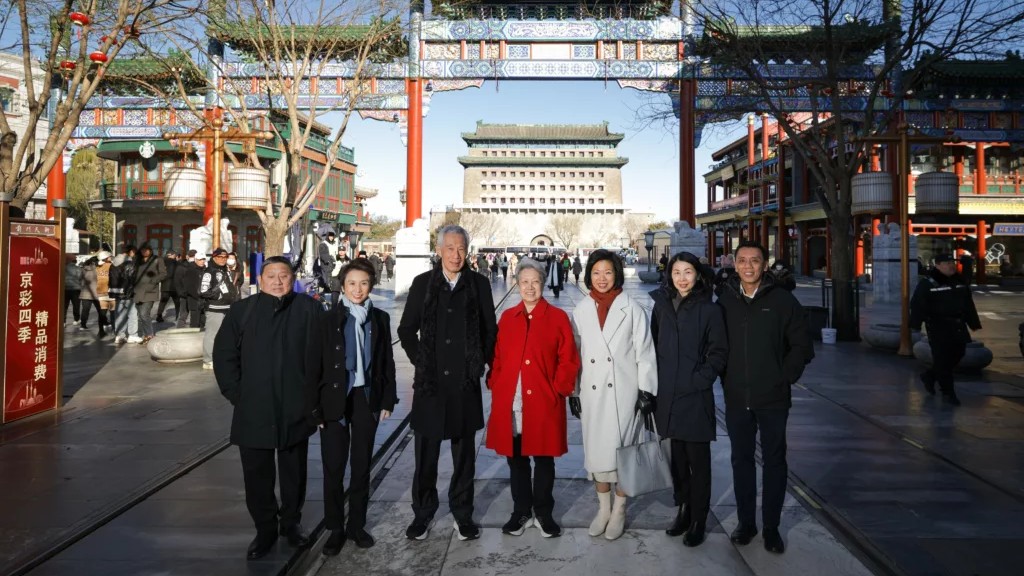Singapore Senior Minister Lee Hsien Loong and his wife Madam Ho Ching doing “#jalanjalan along Qianmen Street to take in the lively atmosphere” of this part of Beijing. | X/@leehsienloong
Singapore’s senior statesman, former prime minister and current Senior Minister Lee Hsien Loong explored culture in China as much as he connected with Chinese politics and business on his recent official visit, which was timed to commemorate the 30th anniversary of the Singapore-China flagship government project, Suzhou Industrial Park (SIP).
Posting a series of images on his X account, signed “LHL”, at the end of his six-day visit, SM Lee wrote: “Took a #jalanjalan at the lively Yuyuan Old Street in the evening. Every corner is captivating as the traditional Chinese buildings are illuminated with beautiful lights.” The phrase “jalan jalan” is Singlish — that is, Singapore English — for “taking a stroll”.

Yuyuan Old Street/LHL

Traditional Chinese buildings at Yuyuan Old Street. | X/@leehsienloong
Cultural similarities abound between Singapore and China, but the push and pull of global diplomacy and the global economy mean that Singapore will have to work extra-hard to maintain its ties with China, especially after the result of the recent presidential election in the United States of America.
Speaking in Shanghai, on the last leg of his China trip, SM Lee told the media, as reported by The Straits Times, that Singapore would have to wait and watch what happened between China and the United States once the new Donald Trump administration took office.
“We know what their basic attitudes are, and the basic contradictions between the US and China remain… Therefore, in this troubled environment, we want to be friends with all sides and to have mutually beneficial relations with all sides,” he said in Shanghai, as quoted by ST.

Lee Hsien Loong visits Agibot, a startup based in Shanghai. | X/@leehsienloong
During his China trip, SM Lee met Chinese President Xi Jinping, and he expressed optimism on X that the “4G team” in Singapore — meaning the government led by Lawrence Wong, the fourth prime minister of Singapore — would “continue to work well with the Chinese leaders to expand bilateral cooperation”.
The ST report said that Lee Hsien Loong, who was the Prime Minister of Singapore for 20 years, had “visited China 14 times, making him one of the most frequent visiting foreign leaders”.
Lee Hsien Loong also met Shanghai Party Secretary Chen Jining as well as Singaporean business leaders in China. He visited Agibot, a startup based in Shanghai.

Lee Hsien Loong visits Xiaomi’s Electric Vehicle (EV) factory in Beijing. | X/@leehsienloong
Towards the end of his official trip, SM Lee met overseas Singaporeans. He posted on X: “Delighted to catch up with overseas Singaporeans based in the Yangtze River Delta region yesterday! I was happy to hear about their experiences living in China, and hope they will continue to thrive and fly our flag high!”

Lee Hsien Loong with overseas Singaporeans. | X/@leehsienloong
30 years of the first Singapore-China G2G project
Suzhou Industrial Park is one of the major outcomes of the close ties between Singapore and China. This mixed-use development spans industries, leisure, education, culture, and more.

Panoramic view of Suzhou Industrial Park. | X/@leehsienloong
In his speech at the Suzhou Industrial Park 30th Anniversary Commemorative Event on 25 November 2024, SM Lee recalled how, in 1994, Singapore and China established SIP with a “meeting of minds and shared political will”. This venture was the first Government-to-Government (G2G) project between the two countries.

Lee Hsien Loong at Suzhou Industrial Park. | X/@leehsienloong
Looking back at the decades that led to this project, SM Lee said, “The story of [Suzhou Industrial Park] traces back to 1978, when [China’s national leader] Mr Deng Xiaoping visited Singapore.
After seeing what Singapore had done, Mr Deng felt that China could adapt elements of Singapore’s development experience to its own reform and development journey. Years later, during his 1992 Southern Tour, Mr Deng reiterated this message.
“On Singapore’s part, [Singapore’s first prime minister] Mr Lee Kuan Yew was likewise keen to see how we could support China’s development. Mr Lee happened to visit Suzhou in 1992 and saw its potential role in China’s reform and development.
With this meeting of minds and shared political will, China and Singapore established the SIP in 1994. The aim was to develop a high-quality industrial township in China, to be a vehicle to adapt Singapore’s experience of economic development, investment promotion, and urban planning to China’s national circumstances.”

Lee Hsien Loong delivers his speech at the Suzhou Industrial Park 30th Anniversary Commemorative Event on 25 November 2024. | X/@leehsienloong
During his current official visit, Lee Hsien Loong reiterated the message of Singapore and China working together. The ST report quoted him as saying in Shanghai, “If we want to make a success of Singapore, we should be able to work with [China], certainly not to neglect them, and least of all to be at odds with them, if at all possible.”
(The article is published under a mutual content partnership arrangement between The Free Press Journal and Connected To India)
